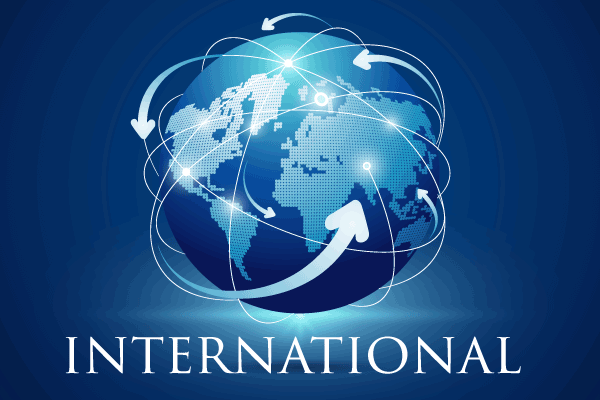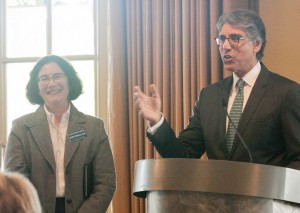 Observations on conditions affecting companies doing business in Latin America were presented at a recent California Chamber of Commerce breakfast gathering by Ambassador Jamal Khokhar, president and CEO of the Institute of the Americas.
Observations on conditions affecting companies doing business in Latin America were presented at a recent California Chamber of Commerce breakfast gathering by Ambassador Jamal Khokhar, president and CEO of the Institute of the Americas.
The March 4 talk and question-and-answer session covered topics ranging from the economy of Brazil, to the importance of trade to the three North American Free Trade Agreement markets and the dynamic potential that Argentina represents under the new government of President Mauricio Macri.
The Ambassador also shared his experience as part of the stakeholders delegation with the recent U.S.-Mexico High Level Economic Dialogue on goals for bilateral trade and economic collaboration. The dialogue was led by U.S. Vice President Joe Biden and Mexico Secretary of Finance Luis Videgaray Caso.
Fresh from five years as Canada’s ambassador to Brazil, and drawing from his posting to Brazil 25 years ago as a Canadian trade commissioner, Khokhar put into historical perspective the gains Brazil made over that period against recent economic and political declines.

Governance Matters
Brazil’s story, the Ambassador said, illustrates the importance of having pragmatic policy frameworks buttressed by sound governance.
While still the seventh largest economic power in the world, Brazil’s growth rate fell into negative territory just the previous day, the Ambassador pointed out. On the morning of the CalChamber discussion, the iconic former president of Brazil, Lula, was arrested amidst charges of corruption.
Good Long-Term Prospects
The Ambassador said he remains “a fan of Brazil.” Businesses that invest and have the capacity to engage for the long-term supported by good local partners can do very well there, he said.
Brazil is among the largest protein producers in the world, a top 5 auto manufacturer and the fourth largest aircraft producer. The country has both massive deep water offshore oil and gas resources and the know-how to take them out.
Other positives he identified include a “hugely dynamic consumer-based market,” a large manufacturing sector “with lots of uptick possibilities,” a globally competitive agro-industrial base, and a large population of educated youth entering the workforce and moving up to the middle class.
Brazilian consumers are very sophisticated, and among the highest consumers of tablets, cell phones, high-definition television, and top users of Instagram, Facebook and Twitter, he said. Moreover, many international fashion designers try their ideas in Brazil first.
National Ethic
In meeting its economic challenges, the Ambassador said, Brazil is not going back to the military dictatorship that ran the country for 25 years. Brazilians are settled on democracy, and they will not tolerate backsliding, he said.
Young people in Brazil also have changed expectations, he said. Going to the streets more than a year ago, the youth demanded things like better education, better public transportation and less corruption in government. One slogan, Khakhar said, illustrated the youth mindset: “A developed country is not one where all the poor people can drive cars, but it’s where all the rich people take public transportation.”
Infrastructure Challenges
A deterrent to growth is the “hard infrastructure” problem facing Brazil, with the lack of roads, ports and airports “choking the life veins and breaking down the economy,” Khokhar said.
Internal tension has arisen from the Brazilian government choosing to invest in building World Cup stadiums and Olympics facilities, rather than maintaining or upgrading existing infrastructure, he said.
The government made good “soft infrastructure” investments, Khokhar said, by funding such education programs as the “Science without Borders,” which paid for 100,000 of the nation’s best and brightest students to go abroad for instruction in science, technology, engineering and mathematics. The U.S. and Canada were among the principal partners for the program, whose funding fell victim to the sharp economic declines, according to Khokhar.
Nevertheless, he said, Brazil is making a great effort to build up its hard and soft infrastructure, which can represent collaborative and commercial opportunities for the international community.
More Information
For more information on the Institute of Americas, see iamericas.org.
More information on trade with Brazil is available at calchamber.com.

